243 books about Mathematics and 7
start with U
243 books about Mathematics and 7
243 books about Mathematics
7 start with U start with U
7 start with U start with U
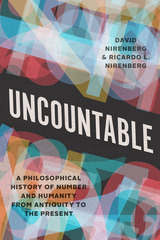
Uncountable
A Philosophical History of Number and Humanity from Antiquity to the Present
David Nirenberg and Ricardo L. Nirenberg
University of Chicago Press, 2021
Ranging from math to literature to philosophy, Uncountable explains how numbers triumphed as the basis of knowledge—and compromise our sense of humanity.
Our knowledge of mathematics has structured much of what we think we know about ourselves as individuals and communities, shaping our psychologies, sociologies, and economies. In pursuit of a more predictable and more controllable cosmos, we have extended mathematical insights and methods to more and more aspects of the world. Today those powers are greater than ever, as computation is applied to virtually every aspect of human activity. Yet, in the process, are we losing sight of the human? When we apply mathematics so broadly, what do we gain and what do we lose, and at what risk to humanity?
These are the questions that David and Ricardo L. Nirenberg ask in Uncountable, a provocative account of how numerical relations became the cornerstone of human claims to knowledge, truth, and certainty. There is a limit to these number-based claims, they argue, which they set out to explore. The Nirenbergs, father and son, bring together their backgrounds in math, history, literature, religion, and philosophy, interweaving scientific experiments with readings of poems, setting crises in mathematics alongside world wars, and putting medieval Muslim and Buddhist philosophers in conversation with Einstein, Schrödinger, and other giants of modern physics. The result is a powerful lesson in what counts as knowledge and its deepest implications for how we live our lives.
Our knowledge of mathematics has structured much of what we think we know about ourselves as individuals and communities, shaping our psychologies, sociologies, and economies. In pursuit of a more predictable and more controllable cosmos, we have extended mathematical insights and methods to more and more aspects of the world. Today those powers are greater than ever, as computation is applied to virtually every aspect of human activity. Yet, in the process, are we losing sight of the human? When we apply mathematics so broadly, what do we gain and what do we lose, and at what risk to humanity?
These are the questions that David and Ricardo L. Nirenberg ask in Uncountable, a provocative account of how numerical relations became the cornerstone of human claims to knowledge, truth, and certainty. There is a limit to these number-based claims, they argue, which they set out to explore. The Nirenbergs, father and son, bring together their backgrounds in math, history, literature, religion, and philosophy, interweaving scientific experiments with readings of poems, setting crises in mathematics alongside world wars, and putting medieval Muslim and Buddhist philosophers in conversation with Einstein, Schrödinger, and other giants of modern physics. The result is a powerful lesson in what counts as knowledge and its deepest implications for how we live our lives.
[more]
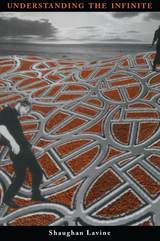
Understanding the Infinite
Shaughan Lavine
Harvard University Press, 1998
How can the infinite, a subject so remote from our finite experience, be an everyday tool for the working mathematician? Blending history, philosophy, mathematics, and logic, Shaughan Lavine answers this question with exceptional clarity. Making use of the mathematical work of Jan Mycielski, he demonstrates that knowledge of the infinite is possible, even according to strict standards that require some intuitive basis for knowledge.
[more]
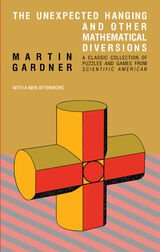
The Unexpected Hanging and Other Mathematical Diversions
Martin Gardner
University of Chicago Press, 1991
Seasoned with Gardner's interest in the history and philosophy of science, this delightful book is a treasure-trove of puzzles, anecdotes, games, and logical theory. These intriguing problems, collected from Gardner's Scientific American columns, involve knots, interlocking rings, rotations and reflections, logical paradox, two-dimensional universes, chess strategies, and gambling odds.
"Gardner conjures problems that are both profound and silly; exquisite truths and outrageous absurdities; paradoxes, anagrams, palindromes and party tricks. . . . He knows, better than most, how many amazing true things there are in the world."—Newsweek
"Gardner conjures problems that are both profound and silly; exquisite truths and outrageous absurdities; paradoxes, anagrams, palindromes and party tricks. . . . He knows, better than most, how many amazing true things there are in the world."—Newsweek
[more]
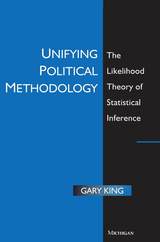
Unifying Political Methodology
The Likelihood Theory of Statistical Inference
Gary King
University of Michigan Press, 1998
One of the hallmarks of the development of political science as a discipline has been the creation of new methodologies by scholars within the discipline--methodologies that are well-suited to the analysis of political data. Gary King has been a leader in the development of these new approaches to the analysis of political data. In his book, Unifying Political Methodology, King shows how the likelihood theory of inference offers a unified approach to statistical modeling for political research and thus enables us to better analyze the enormous amount of data political scientists have collected over the years. Newly reissued, this book is a landmark in the development of political methodology and continues to challenge scholars and spark controversy.
"Gary King's Unifying Political Methodology is at once an introduction to the likelihood theory of statistical inference and an evangelist's call for us to change our ways of doing political methodology. One need not accept the altar call to benefit enormously from the book, but the intellectual debate over the call for reformation is likely to be the enduring contribution of the work."
--Charles Franklin, American Political Science Review
"King's book is one of the only existing books which deal with political methodology in a clear and consistent framework. The material in it is now and will continue to be essential reading for all serious students and researchers in political methodology." --R. Michael Alvarez, California Institute of Tech-nology
Gary King is Professor of Government, Harvard University. One of the leading thinkers in political methodology, he is the author of A Solution to the Ecological Inference Problem: Reconstructing Individual Behavior from Aggregate Data and other books and articles.
"Gary King's Unifying Political Methodology is at once an introduction to the likelihood theory of statistical inference and an evangelist's call for us to change our ways of doing political methodology. One need not accept the altar call to benefit enormously from the book, but the intellectual debate over the call for reformation is likely to be the enduring contribution of the work."
--Charles Franklin, American Political Science Review
"King's book is one of the only existing books which deal with political methodology in a clear and consistent framework. The material in it is now and will continue to be essential reading for all serious students and researchers in political methodology." --R. Michael Alvarez, California Institute of Tech-nology
Gary King is Professor of Government, Harvard University. One of the leading thinkers in political methodology, he is the author of A Solution to the Ecological Inference Problem: Reconstructing Individual Behavior from Aggregate Data and other books and articles.
[more]
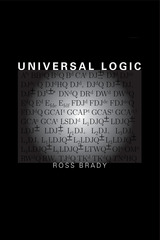
Universal Logic
Ross Brady
CSLI, 2001
Throughout the twentieth century, the classical logic of Frege and Russell dominated the field of formal logic. But, as Ross Brady argues, a new type of weak relevant logic may prove to be better equipped to present new solutions to persistent paradoxes. Universal Logic begins with an overview of classical and relevant logic and discusses the limitations of both in analyzing certain paradoxes. It is the first text to demonstrate how the main set-theoretic and semantic paradoxes can be solved in a systematic way and as such will be of great interest to both scholars and students of logic.
[more]
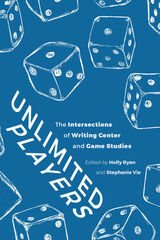
Unlimited Players
The Intersections of Writing Center and Game Studies
Holly Ryan
Utah State University Press, 2021
Unlimited Players provides writing center scholars with new approaches to engaging with multimodality in the writing center through the lenses of games, play, and digital literacies. Considering how game scholarship can productively deepen existing writing center conversations regarding the role of creativity, play, and engagement, this book helps practitioners approach a variety of practices, such as starting new writing centers, engaging tutors and writers, developing tutor education programs, developing new ways to approach multimodal and digital compositions brought to the writing center, and engaging with ongoing scholarly conversations in the field.
The collection opens with theoretically driven chapters that approach writing center work through the lens of games and play. These chapters cover a range of topics, including considerations of identity, empathy, and power; productive language play during tutoring sessions; and writing center heuristics. The last section of the book includes games, written in the form of tabletop game directions, that directors can use for staff development or tutors can play with writers to help them develop their skills and practices.
No other text offers a theoretical and practical approach to theorizing and using games in the writing center. Unlimited Players provides a new perspective on the long-standing challenges facing writing center scholars and offers insight into the complex questions raised in issues of multimodality, emerging technologies, tutor education, identity construction, and many more. It will be significant to writing center directors and administrators and those who teach tutor training courses.
The collection opens with theoretically driven chapters that approach writing center work through the lens of games and play. These chapters cover a range of topics, including considerations of identity, empathy, and power; productive language play during tutoring sessions; and writing center heuristics. The last section of the book includes games, written in the form of tabletop game directions, that directors can use for staff development or tutors can play with writers to help them develop their skills and practices.
No other text offers a theoretical and practical approach to theorizing and using games in the writing center. Unlimited Players provides a new perspective on the long-standing challenges facing writing center scholars and offers insight into the complex questions raised in issues of multimodality, emerging technologies, tutor education, identity construction, and many more. It will be significant to writing center directors and administrators and those who teach tutor training courses.
[more]
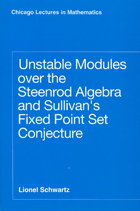
Unstable Modules over the Steenrod Algebra and Sullivan's Fixed Point Set Conjecture
Lionel Schwartz
University of Chicago Press, 1994
A comprehensive account of one of the main directions of algebraic topology, this book focuses on the Sullivan conjecture and its generalizations and applications. Lionel Schwartz collects here for the first time some of the most innovative work on the theory of modules over the Steenrod algebra, including ideas on the Segal conjecture, work from the late 1970s by Adams and Wilkerson, and topics in algebraic group representation theory.
This course-tested book provides a valuable reference for algebraic topologists and includes foundational material essential for graduate study.
This course-tested book provides a valuable reference for algebraic topologists and includes foundational material essential for graduate study.
[more]
READERS
Browse our collection.
PUBLISHERS
See BiblioVault's publisher services.
STUDENT SERVICES
Files for college accessibility offices.
UChicago Accessibility Resources
home | accessibility | search | about | contact us
BiblioVault ® 2001 - 2024
The University of Chicago Press









